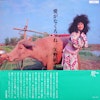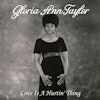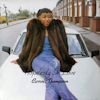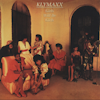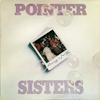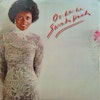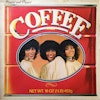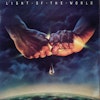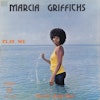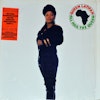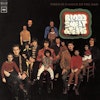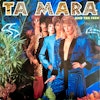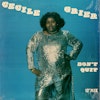This soul sister was born Shéron Lafaye Jones in Augusta, Georgia, on May 4, 1956. If she had been born twenty years earlier, she surely would have been recruited into the James Brown stable, and her name would be mentioned alongside Vickie Anderson, Marva Whitney, and Lyn Collins. As it turned out, the funk would find its way into her life in the form of a curly-haired Jewish kid in Brooklyn in the 1990s, rather than through a pompadoured soul man in Georgia in the 1960s.
Sharon and her siblings—Dora, Charlie, Ike, Willia, and Henry—were moved to New York around 1959. As a young girl, people never really got the French origins of her name and would mispronounce it; eventually she just accepted it and changed it to Sharon. Her mother, Ella May, would send her down South for the summers to visit her father, Thomas Charlie Jones. This only lasted until her father passed away when she was fourteen, but the combination of street smarts and Southern soul have been shaking and baking inside Sharon ever since.
Growing up between Brooklyn and Georgia in the ’60s and ’70s, who were you hearing that was influential to you?
Sharon Jones: We were surrounded by the sounds of Aretha, Gladys Knight, Otis Redding, and the Temptations. Any Motown singer, male or female, it didn’t matter, that’s what influenced me. My sister Dora and my brother Henry used to sing. Henry would imitate James Brown. They used to call him Little Dino, he’d do the splits in the yard. Willia and me would get the hairbrushes out and pretend we were the Supremes. Henry used to sing in some of the same clubs in Augusta that James Brown used to perform in.
Did he ever meet him?
Yes, actually he did. My brother used to tell me about it, but at the time my brother was imitating James Brown he was in his late teens. He stayed in the South, but I was in New York.
Did all your brothers and sisters stay down South?
My mother brought us all up—we lived on DeKalb Avenue in Bed Stuy—but some of them went to stay with my father. So, some of them went to school down there. The boys were a little separate. We all went back and forth. I can’t remember the years, because I was young. My mother had all six of us by the age of twenty-three, and she always worked. People always used to ask her, “How you keep your house so clean?” I was raised that way. My mother was very strict, she had us to the point where we knew when that sun went down we had to get into that house off that stoop. We did not suck our teeth and talk back. And I don’t regret the way my mother raised me. I think she made me a better person. Kids don’t have any fear anymore. That’s why they do what they do today. And it’s sad to say that, but they don’t have that respect thing where your mom or dad say sit down, shut up, you sit down and you shut up, and when you are around any other adult you don’t act up. To this day, I don’t curse in front of my mother.
What kind of work was your mom doing?
She was what they called at that time a domestic. A Jewish family was looking for a woman to sleep in [their home].
How did she get to New York?
My father was beating her half to death, and so she sneaked out of the house at night and left us. She walked down the highway to my grandmother’s house and caught a bus to New York. She lived with this Jewish family. She started out doing domestic work, cleaning floors. Then she got a job at the Mattel Toys factory, doing factory work. She did that until her back had spinal problems and she couldn’t work. Then she got on assistance. Public assistance took care of her. Then my father died, at a very young age, and Social Security took care of her as his wife.
What did your dad do?
My father worked for a pottery factory since he was a kid, and then he ended up working for Serta Mattress when he died. They didn’t pay him nothing. He drove trucks for the Serta company. I was twelve when my father passed away. His kidney failed. They had him in the hospital down South; they thought he was crazy. The doctors were giving him pills, they thought he was out of his mind. Then they got him up to New York, Queen’s General Hospital. I actually went to the hospital and arranged to have him flown up. At twelve years old! I was able to go to the hospital and call the airport. They took him to the airport in the ambulance in his robe and pajamas! That’s how he went to New York. He told me in the hospital down South, “I see these woman with these white, pretty robes on.” And they told him to come with them. He said they had a gold key and they told [him] that this was the key to the kingdom. He said when he gets to New York he’s gonna go with those women. The day after he got to New York he died. They couldn’t help him, they said his kidneys had backed up and poisoned his system. All he really needed to do was to have been on dialysis, but they didn’t do that down there.
So you had to arrange all of that?
My grandparents, at the time, they didn’t know how to talk to certain people. Don’t take me wrong and don’t feel prejudiced, but when it comes to certain white folks, certain Black people don’t know how deal with certain business. They didn’t know what to say, and me, being from New York, I was like, “My dad needs to go to the hospital.” My mother was in New York and she was telling me what to say to the people in the hospital. My mother raised us on her own, my father never really did nothing for us. But she never talked bad to us about him. She still would let us go down and visit. She said, “That’s your father.”
Were your parents musical?
I found out from my mother, later on, that my father used to sing in some gospel quartets in the South. I forget their names.

Who was the first person you saw perform who really sparked you off?
I saw the first Superfest that they had at Madison Square Garden. They had KC & the Sunshine Band, Chaka Khan, Aretha Franklin, even Luther [Vandross] came, and Luther wasn’t even Luther! He came out on the stage and everyone was like, “Who’s that fat guy?” He’d written that song for Aretha, “Jump to It,” and he wasn’t even popular. Stephanie Mills, Ashford & Simpson.
So I was watching that and said, “I want to see myself on stage.” Especially Stephanie Mills, ’cause she’s like my height, 4' 11". [Seeing her] helped me imagine being on stage and performing. At the time I used to sing with bands, but I always wanted to have a record out.
The first band I sang with was Community Funk, and then I had a band called Déjà Vu. Then this band Inner Spectrum was it, man! We always did a mix [of styles]. We had a guitar player/singer who was a white guy. We brought him into Brownsville, where no white people are, and my band—this is how much confidence we had in him—we started doing “Always and Forever.” Everybody was like, “This white boy better sing!” And this guy opened his mouth and everybody lost their minds. I’ve always been with a powerful group.
Did you ever record with them?
No. We were only doing covers at weddings and little things like that. I’ve been doing weddings for twenty years now.
You’re still doing weddings?
Actually, if I can…Yeah! When I’m home, I’m like, “Go for it!” The name of the band is Good & Plenty. We make some good dough, and it’s great fun. I love it. I was at this one wedding recently and these guys come up and they’re like, “Oh my God! Sharon Jones, from Sharon Jones and the Dap-Kings!” The band was like [mumbles and laughs]. The band is retiring soon, but we’ve still got a few gigs lined up.
How did you meet up with Gabe?
Years ago, my ex-fiancé used to play with those guys when they had the Daktaris record and they were doing the Afro thing with Desco Records. They needed three singers to do some background for Lee Fields on his song “Take It or Leave It.” So I went in and said, “Why get three girls when I can do it all?” And that’s how it started. Then they gave me the song “Switch Blade.” They played some music and said, “Just make up some lyrics.” And I start talkin’, “I’ll cut you so fast!” And I went off on it. They slowed the voice down so it sounded like a man.
I was in church and stuff; I wasn’t into partying, boys, and men.
Did you ever take any lessons?
No, I’ve never taken any vocal lessons. It’s just a gift God gave me. I even play piano and organ in my little storefront church, the Universal Church of God. I’ve been at that church now since I was fourteen. Even coming up as a kid, any instrument I’d pick up I could play it. We had a guitar and bass player at the church, and one day a little voice came in my head and said, “Go play.” So I started playing “Oh, When the Saints Come Marching In” with two fingers, and I started making the chords from there. That’s how I play, a lot of musicians play in one key. I don’t know what one key is. Wherever they start singing, I find ’em. The first song I learned how to play and sing was “Yes, Jesus Loves Me.”
My first little solo, “Silent Night,” was when I was five years old. I was visiting down South and I was an angel in bible class in the Young Macedonia Baptist Church in North Augusta, South Carolina. Which is right over the bridge that separates Georgia from South Carolina. I was cute. It was good.
But, believe it or not, in church I don’t get a chance to sing now. They don’t understand the talent they’ve got under [their noses]. [laughs] It’s like if you’re at home, people don’t [appreciate you], they say, “Oh, that’s just Sharon.” But when other people start going, “Oh, you know she did this.” They go, “Oh yeah, you know she goes to my church.” Other than that they couldn’t care less. [laughs]
When was the first time you sang outside the church?
I was in my first talent show when I was in junior high school. I can’t remember what I sang. Maybe it was “I Want You Back”…something like that. The Jackson 5 were just coming out. I went to I.S. 210 and Junior High School 275.
I really started to sing when I went to high school, at Jefferson High School. I used to run track, and I got to sing “The Star Spangled Banner” at football games. They used to call me the “Golden Voice of Jefferson.”
So they knew about you?
They knew. That’s when I did the talent show with Frankie Crocker.
So Frankie Crocker discovered you?
No. He didn’t even choose me that night. He chose this other group that already had a song out. It was someone he brought in. That wasn’t fair, because it was [supposed to be] amateurs. It was for a contract to record with some record label. Everything was running late and my band wasn’t all there yet, but the people were cheering for me to sing. [Frankie Crocker] was like, “Who’s this Sharon Jones?” I came up and he said, “They want you to sing.” I said, “Okay, but I don’t know where my band is at.” The crowd yelled, “She don’t need a band! She can sing a cappella!” So, I started to sing [Bill Withers’s] “Ain’t No Sunshine.” There was a band setting up, and they started to play under me. I started killin’ them!
My band got there and we went on later, but we didn’t win. Frankie Crocker told me, “I didn’t give you first place because you weren’t with a band.” The band he brought won the recording [contract], and I didn’t win second place because it was band equipment. One of the guys from my band went on to play with Brass Construction. He wrote a song we used to do called “Cleaning Out My Heart.” I beat Brass Construction out that night. [Frankie Crocker] didn’t give them first, second, or anything. You know who else I was singing with? Lillo Thomas! [sings] “(You’re a) Good Girl.” He was in my group. He used to run track too. He was fast! He set a world record [20.8 seconds] in the 200 meters. We were the singing duo.

Where did you go after high school?
I auditioned for Magic Touch—they had that song, “Step Into My World.” You know there are two girls on that part? When I went in to audition I did the high part and I did the lead! These two women were standing there watching me and they were in their twenties. At the time, I was just eighteen.
It was the most amazing thing. I did a club date in Albany with them. It was a disaster. I never told anybody, I never even saw pictures from that day. Because at the time I was wearing an Afro and they made me straighten my hair. They said I could fit this girl’s clothes and at the time I was like 36-24-38! I put those clothes on and I was scared to move. I told this guy, “The clothes don’t fit, they’re too tight!” This other girl, she had on some clothes [that didn’t fit] and we were up there singing “Don’t Rock the Boat.” She was up there moving and I was trying to tell her, “Stop. Don’t move your arms!” Ooo! Half her breast had come out! The manager was telling me to keep my eyes forward and not tell her. I said, “Fuck you!” and told her, “Your titty is hangin’ out!” [laughs] The other girls messed up their parts on the song that I [sang lead] on and the manager was yelling, “This girl comes in here and she’s younger than you all! She’s got her harmony together.” He kept calling me, “You want to join our group? We can record and start doin’ a Southern tour.” I would have stayed with those girls, but they wanted me to do things that I wasn’t ready to do. The producer said, “Well, you know, you’ve got to entertain certain producers and managers.” I was like, “What do you mean entertain? Like perform for them?” They were like, “Well, they may want to take you out to dinner and stuff.” I knew what that meant. Just because I was eighteen, they thought I was stupid. I was in church and stuff; I wasn’t into partying, boys, and men.
Did you go to college?
I went to Brooklyn College late. I graduated from high school in 1974 and took a few years before I went to college. I was the youngest of six children in my family, and I wanted to be able to say that at least one of us graduated high school and went to college, but I didn’t finish.
I was in the first Black musical, maybe the first musical, ever performed [at Brooklyn College]. Sister Salvation was written by this guy Lester something—I wish I could remember his last name. He wrote it as a thesis and I played a big lead part in it. I did one performance with it off off Broadway to try to get the financing, but they wanted to bring in bigger names. One night William Marshall, [who played] Blacula, came to see it. It was in, like, 1977—I had just seen Blacula. He said in his low voice, “Break a leg, Sharon Jones.” I was so excited! The guy that wrote the music was Jimmy Sigler, Bunny Sigler’s brother. There was a song in it that I still sing in church sometimes, [sings] “I’m Gonna Trust in the Lord.”
It doesn’t feel like the world is a very soulful place right now, especially in this country. So every little nugget helps. On your new record, Naturally, you do a cover of Woody Guthrie’s “This Land is Your Land,” but you put your own spin on it.
The last time I heard [the traditional version of the] song was with Bush and Kerry, and they were singing [in a nasally voice], “This land is your land.” To me, they’re making fun of it, y’know? It’s our land, but look what’s going on. Come on! So, we had to take that and bring that song back, to revise it, and funk it up. We’ve got to let people know, “Yo! With all this stuff going on, this is still our land.” It’s a great song. We just took it away from that folky old thing of [twangs like a banjo and laughs]. And the [Woody Guthrie Foundation] loves it!
The rest of the songs on the album are all originals. Are you writing any of the lyrics?
No. Bosco, Gabe, writes everything. This is his project, y’know? It’s amazing, because he knows my voice and he knows what kind of music he’s writing. Once I hear the music and he’s got lyrics out, sometimes I come up with the melody. I just go with the music. But then he’ll be like [makes a face], and I’ll go, “Oh, like this?” and he’ll [smile]. It just connects! I think he’s been here before. He’s really a fifty-five-year-old Black man that’s been reincarnated and came back as a thirty-year-old Jewish boy. C’mon, look at him!
Yeah! But even ten years ago he was doing his thing.
Thank you! He told me a story that when he was a kid, all the other kids would come home and listen to rock and stuff, and he’d been in the house listening to Otis Redding…funk and R&B and all that stuff. He’s so talented. Without him it doesn’t make any sense, because no one could take over and direct the band. It’s his thing. It was very scary when he had that [car] accident in March. Look at him now—it’s amazing! God is great. It’s taken us long enough, but I guess it’s our time.
